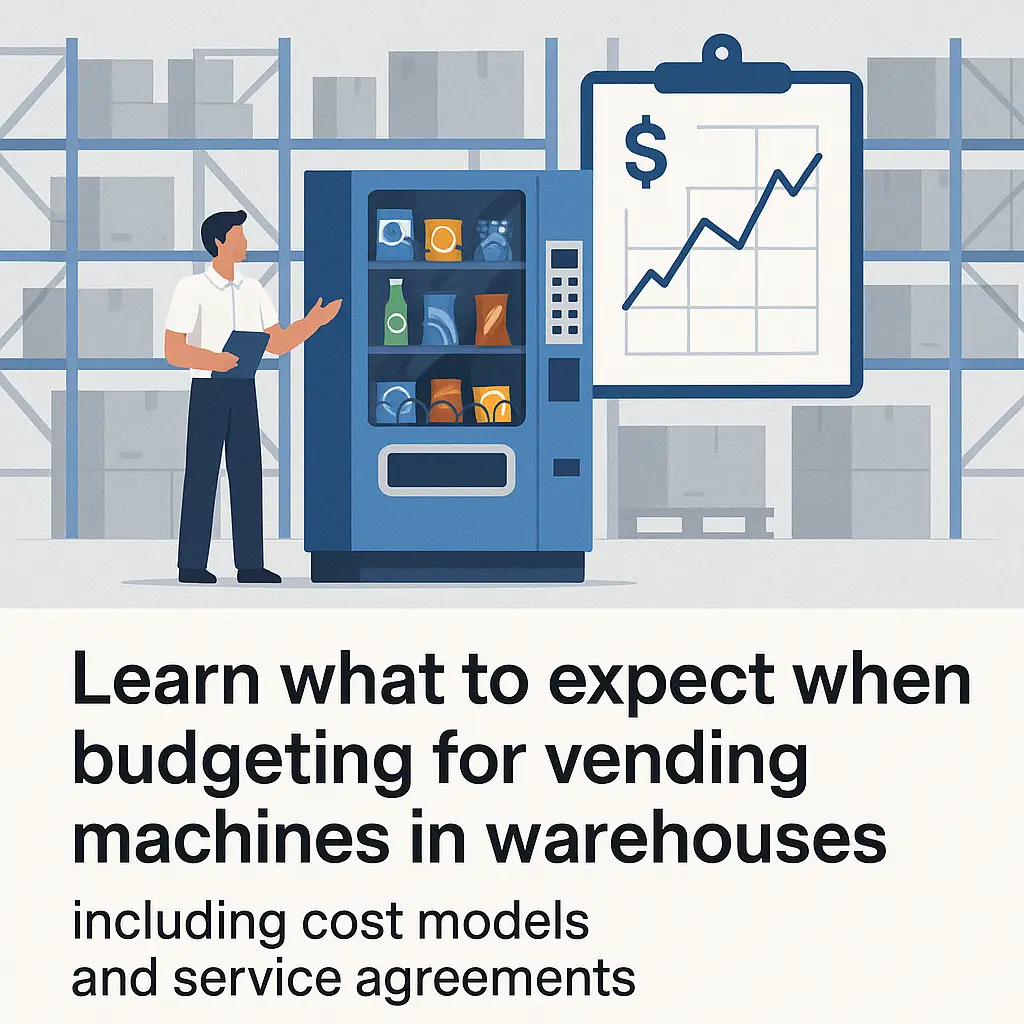Cost of Vending Services for Warehouses
Learn what to expect when budgeting for vending machines in warehouses, including cost models and service agreements.
Back to Vending for Warehouses ResourcesLearn what to expect when budgeting for vending machines in warehouses, including cost models and service agreements.
Back to Vending for Warehouses ResourcesMost warehouse vending programs come at no cost to the facility. Vendors supply the machines, restock as needed, and maintain the equipment. Some advanced setups—like micro markets or smart fridges—may have space or utility requirements to consider, but install and service are often free to qualifying sites.
![]() Most vendors offer machines and service at no cost
Most vendors offer machines and service at no cost
![]() Micro markets typically require higher foot traffic to offset costs
Micro markets typically require higher foot traffic to offset costs
![]() AI coolers handle more SKUs, but require electricity and tech setup
AI coolers handle more SKUs, but require electricity and tech setup

When evaluating vending services for warehouses, most facilities are surprised to learn that the setup typically comes at no upfront cost. Qualified warehouse locations can often receive free vending equipment, delivery, installation, and service—all handled by the vending vendor in exchange for the opportunity to sell to your employees.
Most warehouse vending programs operate on a revenue-share or commission-free model. In many cases, the vendor handles all responsibilities: stocking with drinks, snacks, and shelf-stable meals; maintaining the machine; and servicing technical issues. This makes it easy for warehouse managers to offer breakroom options without administrative burden.
There are several types of vending options to consider. Traditional combo machines are ideal in smaller footprints and offer a mix of drinks and snacks. Larger facilities may want to explore glass-front machines with cashless payment and high-capacity inventory. Micro markets and AI coolers are smart options for higher-volume workplaces, allowing more variety, self-checkout tech, and real-time inventory management. However, these often require power, Wi-Fi, and access-controlled space. While still free to install in many cases, these setups are typically deployed only when traffic volume supports it.
Warehouses interested in healthier offerings can opt for machines stocked with low-sugar drinks, protein snacks, or even full shelf-stable meals. Vendors are willing to customize offerings based on workforce needs. Especially in 24/7 operations, reliability and service responsiveness are critical. Always confirm service-level agreements and restocking frequency as part of vendor selection.
For locations replacing broken or poorly serviced machines, switching providers costs nothing. Vendors will remove outdated or broken units, and install modern, fully functional machines at no cost to the facility.
Understanding the cost structure helps warehouse managers make better decisions without unexpected fees or commitments. Learn more about how product curation impacts workforce satisfaction and productivity.
If you're exploring vending options for your business, Vending Exchange can help simplify the process. Delivery, Installation and Equipment is provided at no cost to you - vendors provide the machines, keep them stocked, and handle all servicing. Whether you need a provider or full-service management, just fill out the form on this page to get started.
In most cases, vending machines are installed at no charge to qualifying warehouses. The vendor provides equipment, handles setup, and maintains the machines.
Reputable vending providers clearly outline service terms. Warehouses typically pay nothing if they're not buying the products themselves. Clarify service levels and repair response times in advance.
Combo machines are most common and typically free. Advanced systems like micro markets or AI coolers may come with utility needs, but still no upfront cost if the location qualifies.
The vending vendor is generally responsible for maintenance, upkeep, and repairs. Make sure service terms are established upfront when selecting a provider.
Yes. Many vendors allow item customization based on employee preferences, dietary needs, or demand for healthy options.
Smart vending machines and stocked micro markets are ideal for facilities operating around the clock. Be sure vendors offer support for after-hours issues.
Most vendors require a certain level of regular traffic—around 50 people minimum—to justify installing equipment at no cost.
You can change providers at any time. The old machines will be removed and new ones delivered—usually within 7 days.
Yes. Most modern vending machines support contactless payments, such as Apple Pay, credit cards, and mobile wallets.
Typically, agreements cover equipment provision, restocking, maintenance, and customer service. All at no cost to the warehouse if criteria are met.